2006
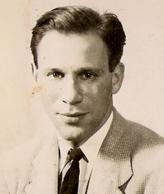 The first chapter of Richard's memoir has been published in the literary and art magazine Vanitas (#2). Richard's dad seems to be OK with it, at least insofar as can be judged from this photo of him in 1950, just after Richard was born. In the magazine the memoir excerpt is listed as being from "The Autobiography of Richard Hell by Richard Meyers." Another title Richard's considering is I Dreamed I Was a Very Clean Tramp. In the published chapter, Hell includes a couple of the "false starts" he made as he was trying to figure out how to write the book. One of them went like this:
The first chapter of Richard's memoir has been published in the literary and art magazine Vanitas (#2). Richard's dad seems to be OK with it, at least insofar as can be judged from this photo of him in 1950, just after Richard was born. In the magazine the memoir excerpt is listed as being from "The Autobiography of Richard Hell by Richard Meyers." Another title Richard's considering is I Dreamed I Was a Very Clean Tramp. In the published chapter, Hell includes a couple of the "false starts" he made as he was trying to figure out how to write the book. One of them went like this:
I don't like speaking for the record from "myself" and I don't trust memory. To me "myself" is at best kind of like my memory itself: this big greasy moonscape smothered in fog where here and there little swatches of grainy color turn out to be scenes being played over and over by half-assed amateurs who tend to perform by rote, forget their lines, misplace props, fool with their make-up, reinterpret and revise their roles, fade, disappear, puke, kill, and die. It's sad, unreal, funny, and signifies almost nothing.
Everything that happens to "me" decays on the spot to that place, which my conscious trespassing can't begin to map, a place where there are no directions, where the only discernable features of the landscape are events that don't just change shape but change position. Trying to get it is like trying to understand history--all you're going to understand is the little you can understand about how you understand things...
One's defined character, one's store of memories, one's identity, is habits, it's ruts, it's a burden. ("Oh no, here I am again. Couldn't someone else be me for a while?") The most enjoyable thing to do is shed it. Not that you really can, but the notion that you can, or the momentary sense that you have, that you're new again, and someone else can do the dealing with your old phenomena, is great.
Setting down the memories doubles their falsity: not only is the writer fixing blurs and odd angles as if they were multi-dimensional and defined, but presenting them as final in their context, when at another moment than the one when written, the memories might have seemed to have different positions in relation to everything altogether. But setting them down is an interesting challenge: to try to be as true as possible, and to get free.
My favorite thing to do as a kid was to run away. The words "lets run away" still sound magic to me. There's no thrill like starting as a stranger somewhere else again (though it's also fun to have an accomplice). I can see my whole life as a pirate's treasure map with each big "X" being a running away.
Somehow the photo here of Richard at six seems to contradict this suspicious attitude. And the present day Richard does eventually decide his memory's fine. For more from the memoir, there's a section regarding Hell's youthful hair fetishism in Vice magazine. It's supposed to be the fiction issue of Vice, but Hell says the piece is "actually an excerpt from my memoir modified by my removal of anything not Vice-worthy (I liked the way it worked so well, I was tempted to give the whole memoir that treatment)."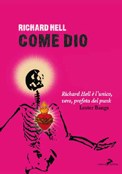
Cintra Wilson's brief, funny interview with Hell about the memoir is at the Oxford American site. That well-known southern literary magazine's eighth annual Music Issue included an article by Wilson on Hell, as well as one by Charlie Bertsch [subsequent note: Bertsch's full article]. Another funny interview--this one intended to be about Godlike--was conducted by Mark Prindle, Web music master extraordinare.
It ran at the end of 2005, but we never got to posting it. (The wack reviewing style that Hell refers to in the interview can be seen in these Prindle reviews of Hell recordings.) Speaking of Godlike, it's just come out in an Italian translation, as Come Dio, published by Coniglio (Rome).
Richard can be found throughout the new Up Is Up But So Is Down, a huge, flabbergastingly entitled, scrapbook of "Downtown" New York writings 1974-1992, edited by Brandon Stosuy. 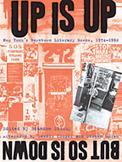 Other authors in it include Kathy Acker, Dennis Cooper, Lynne Tillman, David Wojnarowicz, Eileen Myles, Cookie Mueller, and Patti Smith. Other authors in it include Kathy Acker, Dennis Cooper, Lynne Tillman, David Wojnarowicz, Eileen Myles, Cookie Mueller, and Patti Smith.
A few weeks before CBGB closed down, there appeared a book of photos of the club's empty interior, called CBGB: Decades of Graffiti, with an introduction by Richard. We have available copies of the book signed by Richard. The weekend of the last shows at the club, The New York Times published an "op-ed" piece by Hell on the demise of CBGB. [posted Dec 31, 2006]
 That's Richard with his wife Sheelagh Bevan at the Paris club Le Baron for the afterparty the night of Richard's reading at the Cinémathèque française on April 7th. The reading, which took place in the Frank Gehry building which now houses the Cinémathèque (an institution that once was largely housed in Henri Langlois's bathtub), was sold out. It was video recorded for French tv as well as by Angelique Bosio, filmmaker of the documentary of '70s-'80s New York underground film called Transgressive Art.
That's Richard with his wife Sheelagh Bevan at the Paris club Le Baron for the afterparty the night of Richard's reading at the Cinémathèque française on April 7th. The reading, which took place in the Frank Gehry building which now houses the Cinémathèque (an institution that once was largely housed in Henri Langlois's bathtub), was sold out. It was video recorded for French tv as well as by Angelique Bosio, filmmaker of the documentary of '70s-'80s New York underground film called Transgressive Art. 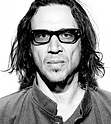 Two weeks later Hell read to another full house at The Walker Art Center in Minneapolis (which reading was video recorded by the museum). Hell's series of appearances publicizing his new novel Godlike is almost complete. Two weeks later Hell read to another full house at The Walker Art Center in Minneapolis (which reading was video recorded by the museum). Hell's series of appearances publicizing his new novel Godlike is almost complete.
Speaking of Godlike, the novel has just received two more amazing reviews, both written by highly respected art writers, and interesting for treating opposite aspects of the book. One review, by Barry Schwabsky, discusses the book's formal intellectual and aesthetic stance -- while also making the point that "Anyone who ever doubted that Hell could achieve with words alone something as compelling as what he's done with words and music together will have to think again" --, while the other, by Leora Lev, splashes around in the book's viscera of "ecstatic, sublime, obscene, and unspeakable undifferentiation ."
After Hell's reading at The Andy Warhol Museum in Pittsburgh at the end of this month, he'll return to full time work on his current main project, a "quasi-memoir." The first chapter of this book is scheduled to appear in Vincent Katz's literary/art magazine Vanitas this summer. 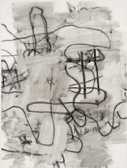 Richard says that there are two titles he's considered for the book, both of which it is unlikely enough that he will actually use that he doesn't mind revealing them: Richard Hell by Richard Meyers; and I Can't Remember. Richard says that there are two titles he's considered for the book, both of which it is unlikely enough that he will actually use that he doesn't mind revealing them: Richard Hell by Richard Meyers; and I Can't Remember.
Apart from his film column for BlackBook magazine, Hell has had pieces in three releases in recent months (two of which we now have available on site). He contributed an essay, "Sadness Notes" to the catalogue for an art show called Sad Songs, and a song to a tribute CD for Dennis Cooper called Dennis story -- song. He also wrote the text -- an essay entitled "The Happy Nightmare of the Visual" -- for the catalogue of Christopher Wool's recent art show at Gagosian Gallery in Beverly Hills. (You can see the press release for the show, a few of the paintings in it, and the catalogue for sale via Gagosian.) Wool supplied the art on the covers of both Hell's poetry pamphlet Weather, and the new novel, Godlike.
Also, NYU's Fales Library now has up a broad but fairly complete "Guide to the Richard Hell Papers," the collection of Hell's mss., tapes, photos, etc., which the University purchased in 2003 (see the New York Times article), ranging from letters of Richard's parents in 1944, years before he was born, up to mss. of Godlike from 2003.
[posted May 21, 2006]
top
|

